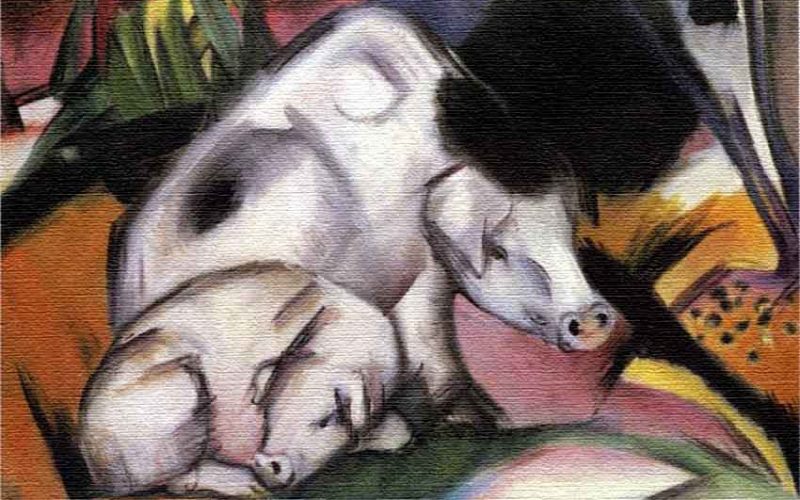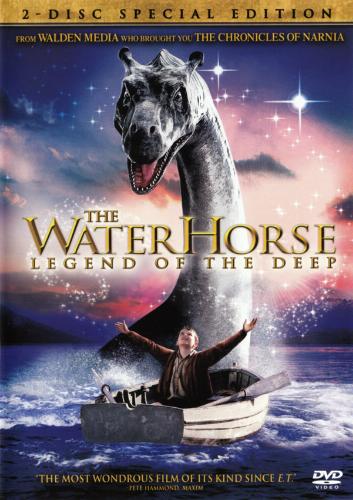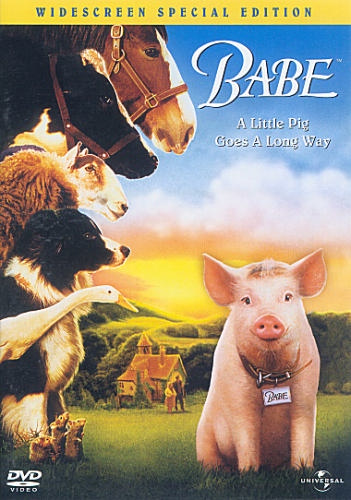Writing my books is like handing out presents. Giving children pleasure gives you a wonderful sort of Father Christmassy feeling.
Once upon a time, there lived a fellow who failed at everything he tried. Soldier, farmer, shoemaker, teacher—all promising but none ended well.
But he married a girl who loved him true. She knew he would succeed.
They bought a ramshackle cottage and raised three babies, and pigs and dogs and guinea hens and frogs. He wrote about them all.
On a day like any other came a knock on the door, and imagine his surprise. It was Hollywood!
Yes, this is a true and wonderful tale. Dick King-Smith (1922-2011) penned a beloved children’s book that became a blockbuster hit. Can you guess which one? I’ve already dropped two hints.
Soldier to Farmer
Dick was born Ronald Gordon King-Smith (no one explains where he got “Dick”) in England’s beautiful West Country, the son of a paper factory mogul. At 13, he met a girl named Myrle who shared his interest in breeding parakeets. According to The Telegraph UK :
Myrle’s breeding followed formal bloodlines, and produced birds of pure, vibrant colour. King-Smith’s approach was more haphazard; he let them get on with whomever they liked, with variable results.
Dick and Myrle became sweethearts and married when both were 21, but World War II tested their love.
In 1941, at age 19, Dick was dispatched to Italy as an officer in the Grenadier Guards. A year after they married, Dick and his platoon ran into enemy paratroopers in a wood 30 miles south of Florence. The next thing he knew, he saw a grenade “coming through the air as you might see a catch coming in a cricket match.”
The explosion ripped through him, puncturing his lungs. He took three years to mend, by which time the war was over. “So you could say I failed as a soldier,” he says. I’d say he was a hero.
Myrle stayed with him throughout his convalescence. Once he recovered, they managed a farm attached to his father’s paper mills, originally meant to supply milk and eggs to the canteen.
But Dick King-Smith loved animals (especially pigs) and was good with stock, so the farm flourished for a while. Unfortunately, he had no affinity for numbers and, after 20 years, his farming ventures went bankrupt:
As a child I had pets—rabbits, tortoises, rats, mice—and a toy farm which I played with endlessly…I never minded much what went with what, so I included a giraffe among the dairy herd…I ran my farm in much the same way. I had animals that I liked. Now I see that it was rather a stupid way to run a farm, but at the time I felt I didn’t have to conform.
Shoemaker to Teacher
Dick took a series of odd jobs, including selling firefighting suits and managing a shoe factory. At age 49, he enrolled in a teacher-training course and graduated from college three years later, the same time as his 21-year-old daughter.
At age 52, he began teaching at Farmborough Primary School. His casual relationship with numbers came back to haunt him. He was demoted to teaching the youngsters because he couldn’t do long division. But he adored the job and, during his first summer vacation, he started writing a children’s book.
At age 56, he published The Fox Busters to rave reviews. He wrote a book or three a year after that, almost always about his beloved barnyard animals.
Finally It All Comes Together
Dick King-Smith finally became a full-time writer in 1982, at age 60. His daily schedule:
“Sit down in my very small study in my very old (from 1635) cottage; scribble in longhand in the morning; in the afternoon, type out the morning’s work (on an old portable typewriter, with one finger); evening, read day’s work to my wife, seeking her approval.”
Myrle and Dick were married for over 55 years, until her death in 2000. She was always his avid supporter and first reader.
In 1990, he published a book about a lonely Highland boy who discovers a mysterious egg that hatches into the Loch Ness Monster. Jay Russell adapted The Water Horse into glossy $45 million movie production. Dick took his great-great-granddaughter Adelaide to a private viewing of it.
Dick felt this story wasn’t as good as some of his others, but he loved the “really beautiful” monster (brought to life by Peter Jackson’s Weta Digital) and the passionate performance of child actor Alex Etel.
Dick’s favorite of all his stories was published in 1983 when he was 61. The Sheep-Pig told the story of a frightened piglet adopted by a sheepdog and her pups and taught their trade.
It was brought to the big screen in 1995 as Babe: The Gallant Pig, one of the most-awarded children’s movies of all time. It lost the “Best Picture” Oscar to Braveheart. Did you guess?
Dick King-Smith’s love of kids and animals led him to “failed” careers in farming and teaching until he found the perfect way to combine the two. It tickled him that his spectacular success came after “retirement” age.
Yes, it’s all arsey-versey. I do like that. It dawned on me after a long time that I was at last in the business of giving people pleasure.
He died peacefully in his sleep at age 88.
If you enjoyed this tale about Dick King-Smith, you’ll love reading about Beatrix Potter: Her Astonishing Talents and Passions Beyond Peter Rabbit.
Late-Blooming Wisdom Inspired by Dick King-Smith
- Failures are merely dress rehearsals for success.
Sources
- The Telegraph UK, “Obituary”
- The Herald Scotland, “Animal Magic”
- Opening Image: Pigs by Franz Marc (1912)


